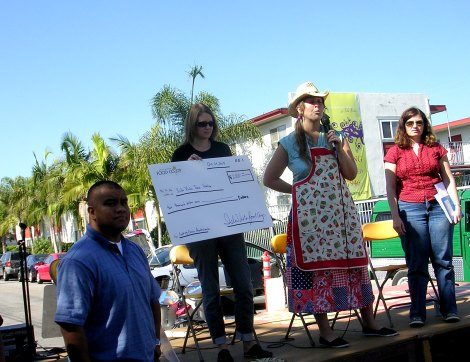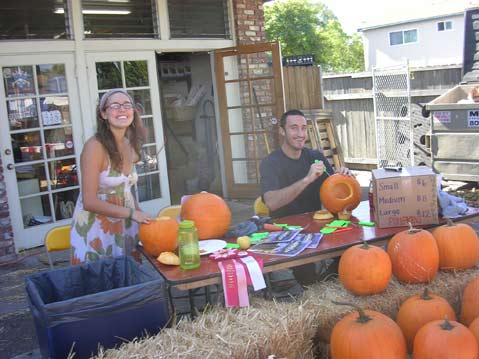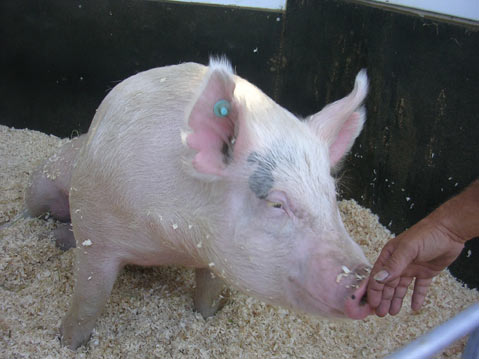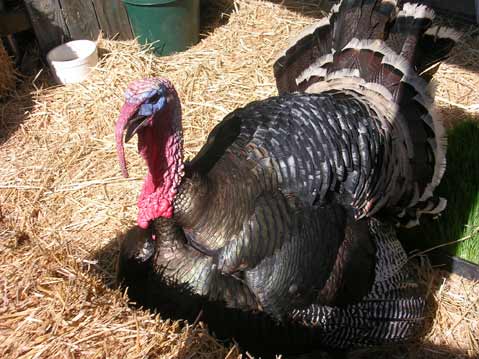Isla Vista Food Co-op Sponsors County Fair
Awards Grants for Cooking, Community Gardening

The Isla Vista Food Co-op’s Country Fair (and grant allocation event) on Saturday, October 24, showcased the co-op’s laudable community efforts and provided a forum for other groups also interested in local food and environmental causes. Combining public education with good old-fashioned autumn fun, the festivities included a visit from a 360-pound pig, kids’ crafts, and pumpkin carving.

Melissa Cohen, store manager and marketing and outreach coordinator, called the fair a “true community event that gave like-minded people a venue to do education and outreach.” The co-op defines itself as “a trusted source of natural and organic products … driven not by profit, but by motivation for community autonomy, mutual aid, and environmental justice,” according to its mission statement.
The many organizations with tables at the Country Fair represented similar views, promoting causes like sustainable agriculture and organic food. Participating organizations included Food Not Lawns, Figueroa Farms, Medicine Tree Project, Goleta Family School, and KCSB radio, which also sponsored the event. Cohen congratulated the “many people with different skills and talents coming together.”

The importance of buying food produced at local farms, instead of on faraway continents, was a main theme of the event. (The I.V. Food Co-op prides itself on offering a wide range of locally grown foods.) Donald Cole, owner of San Marcos Farms, came to educate the public about what he called the “dual purpose” of the honey bees on his Santa Barbara farm, bringing with him a display of live bees. Not only do his bees produce the materials to make honey, pollen, and beeswax candles, but they also pollinate local crops. Thus the bees support many local businesses, like a co-op customer does when she buys products grown on local farms.
The co-op also demonstrated at the fair the good service it does in addition to offering the tri-counties’ food with a social and environmental conscience. The Isla Vista Teen Center and St. Michael’s Community Church each received grants generated by the co-op’s community fund. The Teen Center was awarded $2,000 toward a cooking class, healthy snacks, and school supplies. St. Michael’s was given $1,500 for the implementation of a community garden. Co-op members and shoppers support the community fund, dedicated solely to aiding local nonprofits, through the I.V. store’s Bring-Your-Own-Bag Program. When a customer provides his own bag instead of taking a disposable bag provided by the store, he is handed a token, worth five cents, to place in a jar by the register to go toward the community fund. Cohen reports that the tokens accumulate surprisingly quickly.

The Isla Vista Food Co-op opened in 1972. The S calls its founding a “rebirth” for I.V. after the era of violence and rioting that came in response to residents’ discontent with corporate and university policy in the community in the early ’70s. The organization evolved in part out of a community-based bulk foods buying project, the Whole Wheat Buying Club, that sought to put an end to dependence on corporate grocers by purchasing and selling staple foods directly to the community. There are now nearly 3,000 I.V. Co-op member-owners, and “everyone can shop, anyone may join.” The store also provides its customers additional food options, such as vegan and gluten-free products.



